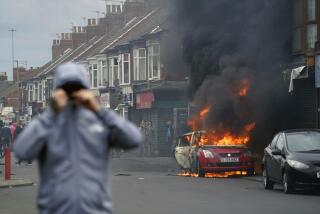Bomb Hurts 17 at N. Ireland Hotel; IRA Denies Role
- Share via
BELFAST, Northern Ireland — Capping the worst week of violence in this troubled province in years, a bomb shattered a resort hotel near the western town of Enniskillen on Sunday, injuring 17 guests. The Irish Republican Army denied responsibility.
A warning telephone call to the Killyhevlin Hotel about 30 minutes before the explosion enabled the hotel staff to clear the guests from the building with just moments to spare.
But many standing outside--including a bride and groom who were holding their wedding reception at the hotel--were injured. Seventeen people were treated for shock and glass cuts resulting from the explosion of the 1,200-pound bomb, which was planted in a four-wheel-drive vehicle outside the front door of the hotel.
Police speculated that Sunday’s blast--which came after a week of sectarian rioting in the British province--may have been the work of a little-known nationalist splinter group known as the Republican Sinn Fein. The group has operated out of the Irish capital, Dublin, and seeks Northern Ireland’s unification with Ireland.
“Whoever they were, they were republicans,” said David Ervine, a leader of the pro-British unionists, who support continued British rule in Northern Ireland. “Now the loyalists will probably have to rise to the occasion, and we as a society after the exhilarating days of peace face the prospect of going to hell and back.
“For ordinary people it has been a brutal and terrible week, and it is clear that the republicans are not ready for peace.”
Ervine said he feared that the Protestant unionist paramilitary groups might declare an end to their cease-fire. In February, the IRA broke a truce that had existed among paramilitary groups here since the fall of 1994, but their bomb attacks have been confined to England.
*
Gerry Adams, the leader of IRA political wing Sinn Fein, suggested that the bombing may have been the work of unionists trying to cast blame on republicans.
The attack came in a province that has been gripped by rioting over a Protestant group’s annual march through a Roman Catholic section of Portadown, a mainly Protestant community about 25 miles southwest of Belfast, the capital of Northern Ireland. The Royal Ulster Constabulary, or RUC, first prohibited the march by the Orange Order, sparking protests by unionists. When the RUC reversed itself Thursday and allowed the march to proceed, Catholic nationalists rioted across Northern Ireland.
The province’s cities were mostly quiet Sunday, but authorities were bracing for more unrest.
Speaking during a march to mark the death of Dermot McShane, who was killed in rioting in Londonderry early Saturday, Adams said the timing of the blast was “immensely suspicious,” pointing out that the bombing occurred while outrage was focused at police and British authorities for allowing the Portadown march to go ahead.
Both Catholic nationalists and Protestant unionists criticized the RUC and British Prime Minister John Major for the decision.
Adams also argued that the British government’s actions against the republican community in Northern Ireland in the past week “validated” the IRA’s refusal to turn in its weapons as part of the cease-fire--and as a condition of Sinn Fein being allowed to attend all-party talks on the future of the province, which has been wrenched by sectarian violence since 1969.
On Sunday, Irish Prime Minister John Bruton and Britain’s Northern Ireland Secretary Patrick Mayhew condemned the Enniskillen bombing, with Mayhew describing it as “disgraceful.”
Irish Deputy Prime Minister Dick Spring said the bombing was a reminder of the “worst nightmares of the past 20 years.”
Enniskillen, which is about 70 miles southwest of Belfast, was the target of a huge IRA bomb that killed 11 people in 1987 during a Protestant march commemorating the city’s wartime dead.
The Killyhevlin Hotel, with lakes nearby, is a favorite with tourists from Germany and Scandinavia who come for fishing holidays. The vehicle carrying the bomb was stolen in Dublin on July 3, police reported.
More to Read
Sign up for Essential California
The most important California stories and recommendations in your inbox every morning.
You may occasionally receive promotional content from the Los Angeles Times.













